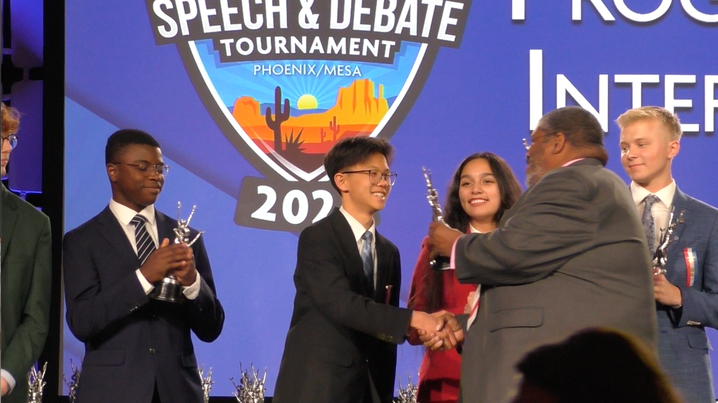Nearly 140,000 students across the country are National Speech & Debate Association (NSDA) members, but only 4% of them qualify for nationals, which were held in Phoenix, Arizona from June 11 to 16. To qualify, competitors must place in the top 3 spots in the yearly district tournament, which juniors Timothy Leung and Kinnera Potluri achieved by placing first and third in their respective events in the California Coast District Tournament last March.
Additionally, competitors may also automatically qualify for the year’s national tournament — without needing to attend a district tournament — by reaching semifinals or higher at the previous year’s national tournament.
“In the state tournaments, you just see the same people and the same speeches over and over again, in your event,” Potluri said. “But at this tournament, you see tons of new speeches and new people who have different skill sets. They’re all very good obviously, because they have to make it there, but some of them are really extraordinary.”
Potluri initially followed in the footsteps of her older brother Shravan Potluri, a class of 2022 alumnus, by participating in the Dramatic Interpretation event starting in freshman year. In Dramatic Interpretation, competitors perform a passage taken out of any published literary work, such as a play or short story, and channel the personalities and emotions of the characters they’re portraying.
However, Potluri was later drawn to the light-hearted nature of the Humorous Interpretation event and eventually made the switch last year. Like Dramatic Interpretation, students select an existing literary work to perform, but while Dramatic Interpretation is generally more serious and aims to evoke strong emotions, the priority of a Humorous Interpretation speaker is comedy.
Keeping the judges’ attention, and more importantly making them laugh for up to 10 minutes, is the main challenge for competitors. Aside from the passage choice, Potluri emphasized that being loud and engaging in physical comedy, including lively body language and facial expressions, is necessary for success.
“A lot of it isn’t just the joke,” Potluri said. “A lot of it is how you perform it, finding scripts that have jokes that you know will appeal to the specific age range of the judges.”
Another important aspect of keeping the audience’s attention, according to Potluri, is maintaining a story throughout the speech. Her speech at the Phoenix tournament detailed a man’s journey to embrace his culture and the people around him.
Unlike Potluri, Leung participates in the Program Oral Interpretation (POI), which aims to convey a cohesive narrative about any theme or idea. Competitors have more freedom in this event, as they arrange and splice multiple different passages together into a single script. A POI speaker must include two of the three following types of literature — prose, poetry and drama — in their manuscript.
According to Leung, a speech’s storyline will typically center around a “thread,” or one specific passage that ties everything else together.
“With POI, since you have so many different pieces, it’s hard to empathize a lot of times because you’re constantly going back and forth,” he said. “So you have one piece that’s a storyline and a narrative that you can follow. That helps ground the entire story and make it easier to follow and also easier to connect with.”
Leung’s speech at the Phoenix tournament advocated for the breaking of stigmas in Asian communities that prevent survivors of child molestation from speaking about it. Although much of his speeches are meticulously planned ahead of time, some choices are made on the spot.
“All of it is very precise, to the second, but it’s also very emotive where you have to be in the moment and feel what you’re saying,” Leung said. “I don’t really want to try to plan emotion or it’ll seem ingenuine.”
Leung placed 8th in his category, making it to semifinals and qualifying for this year’s nationals.
At next year’s national tournament, Leung is planning to speak about microaggressions and how someone’s environment can shape them to be discriminatory.
Both Potluri and Leung are also constantly improving, seeking advice from coaches and also applying feedback given to them by judges at tournaments to become better speakers.
“The junior year season is when you go all out and go crazy, so I want to hopefully have a speech that lives up to that,” Leung said.

























